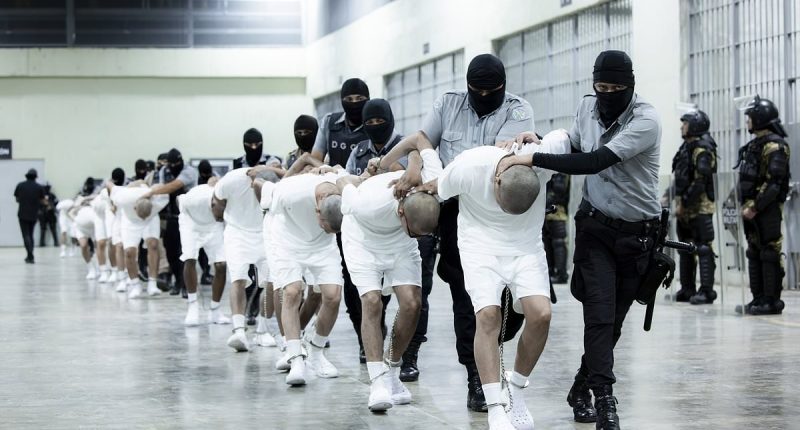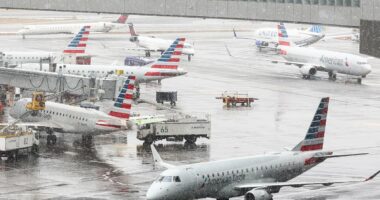Share this @internewscast.com
A federal judge with whom Donald Trump has had disagreements concerning his deportation policy decided on Wednesday that the White House must allow migrants sent to a prison in El Salvador the opportunity to contest their deportations.
Chief Judge James Boasberg of the U.S. District Court has already drawn significant ire from Trump, particularly after his mid-March decision to halt Trump’s deportation flights involving illegal immigrant gang members.
Trump has labeled Boasberg as a ‘radical’ appointed by Barack Obama, accusing him of trying to undermine presidential authority. Meanwhile, Republicans have called for the judge’s impeachment, prompting Supreme Court Chief Justice John Roberts to offer his support for Boasberg.
Boasberg remained defiant in a ruling Wednesday, saying that people who were sent to the prison under an 18th-century wartime law haven´t been able to formally contest the removals or allegations that they are members of the Venezuelan gang Tren de Aragua.
He ordered the administration to work toward giving them a way to file those challenges.
The judge wrote that ‘significant evidence’ has surfaced indicating that many of the migrants imprisoned in El Salvador are not connected to the gang ‘and thus languish in a foreign prison on flimsy, even frivolous, accusations.’
Boasberg gave the administration one week to come up with a manner in which the ‘at least 137’ people can make those claims, even while they’re formally in the custody of El Salvador.
‘Judge Boasberg has no authority to intervene with immigration or national security – authority that rests squarely with President Trump and the Executive Branch,’ White House spokesperson Abigail Jackson told DailyMail.com in a statement.

A federal judge Donald Trump has called a Barack Obama-appointed radical ruled Wednesday that the White House must give migrants sent to an El Salvador prison a chance to challenge their removals

U.S. District Court Chief Judge James Boasberg said that people who were sent to the prison in March under an 18th-century wartime law haven´t been able to formally contest the removals or allegations that they are members of the Venezuelan gang Tren de Aragua
‘His current and previous attempts to prevent President Trump from deporting criminal illegal aliens poses a direct threat to the safety of the American people. Fortunately for the American people, Judge Boasberg does not have the last word.’
Skye Perryman, the President and CEO of Democracy Forward representing the plaintiffs, celebrated the decision.
‘Today’s ruling affirms what every American knows: in the United States, people are entitled to due process and no one should be removed from the country without it,’ Perryman told DailyMail.com in a statement.
‘What has long separated the United States from autocratic regimes is the recognition of this process. We will continue to oppose this administration’s attempts to re-write the protections afforded under the Constitution.’
It’s the latest milestone in the monthslong legal saga over the fate of deportees imprisoned at El Salvador´s notorious Terrorism Confinement Center.
After Trump invoked the Alien Enemies Act of 1798 in March and prepared to fly planeloads of accused gang members to El Salvador and out of the jurisdiction of U.S. courts, Boasberg ordered them to turn the planes around.
This demand was ignored. Boasberg has found probably cause that the administration committed contempt of court after the flight landed.
El Salvador President Nayib Bukele posted a taunting message on social media – reposted by some of Trump’s top aides – that read ‘Oopsie, too late.’

Trump has criticized Boasberg’s rulings in the past
The U.S. Supreme Court later ruled that anyone targeted under the AEA has the right to appeal to a judge to contest their designation as an enemy of the state.
Boasberg said he was simply applying that principle to those who’d been removed.
The judge said the administration ‘plainly deprived’ the immigrants of a chance to challenge their removals before they were put on flights.
Therefore, he says the government must handle the migrants cases now as if they ‘would have been if the Government had not provided constitutionally inadequate process.’
In a remarkable passage, Boasberg wrote that he accepted the administration’s declaration, filed under seal, providing details of the government’s deal with El Salvador to house deportees and how that means the Venezuelans are technically under the legal control of El Salvador and not the United States.
But, he said, believing those representations was ‘rendered more difficult given the Government´s troubling conduct throughout this case.’
He noted the Supreme Court had to act again in the saga, to halt an apparent effort to get around that requirement with a late-night flight from Texas in April.
Boasberg also noted parallels with another case where the Trump administration admitted it mistakenly deported a Maryland man to El Salvador and has been ordered by a judge, appellate judges and the U.S. Supreme Court to ‘facilitate’ his return.
















